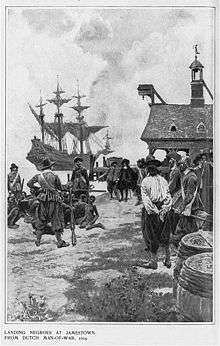First Africans in Virginia
The first Africans in Virginia were a group of 20 to 30 captives originally from the Kingdom of Ndongo in modern Angola, who arrived in 1619 in the colony of Virginia. They had been part of a larger group heading to Mexico, and were taken after an attack on their Portuguese slave ship by English privateers. Their arrival is seen as a beginning of the history of slavery in Virginia and also as a starting point for African-American history, given that they were the first such group in mainland British America.[1] The 400th anniversary of their arrival was marked by The 1619 Project of The New York Times, the Year of Return in Ghana, and other commemorations.

From Angola to Mexico
Thousands of people were captured by Portuguese slave traders and their local allies such as the Imbangala in invasions of the Kingdom of Ndongo (or "Angola") under Governor Luís Mendes de Vasconcellos. These were taken to port and often sent to other parts of the Spanish and Portuguese empires, which were brought together in that time by the Iberian Union.[1]
The fluyt San Juan Bautista took a large group through the Middle Passage from Luanda in Angola to the bay of Veracruz in Mexico, before the attack by English privateers. Of the 350 total on the slave ship, about 143 died in the voyage, and 24 children were sold during a stop at the Colony of Santiago in Jamaica, with 123 enslaved people eventually being taken to Veracruz, in addition to the smaller group of 20-30 taken by the English.[1]
From Mexico to Virginia
Near Veracruz in the Bay of Campeche, the English privateers White Lion and Treasurer operating under a Dutch letter of marque, sponsored by Robert Rich, 2nd Earl of Warwick, attacked the San Juan Bautista, and took 20-30 of the enslaved Africans to Old Point Comfort on Hampton Roads at the tip of the Virginia Peninsula, the first time such a group was brought to mainland British America.[1] English privateers had been flying under Dutch flags since the 1604 Treaty of London.
The primary source document for their arrival is as follows:[2]
About the latter end of August, a Dutch man of Warr of the burden of a 160 tunes arriued at Point-Comfort, the Comandor name Capt Jope, his Pilott for the West Indies one Mr Marmaduke an Englishman. They mett wth the Trer in the West Indyes, and determyned to hold consort shipp hetherward, but in their passage lost one the other. He brought not any thing but 20. and odd Negroes, wth the Governor and Cape Marchant bought for vietualle (whereof he was in greate need as he p’tended) at the best and easyest rate they could. He hadd a largge and ample Comyssion from his Excellency to range and to take purchase in the West Indyes.
— Records of the Virginia Company (1619)
Commemoration
The 350th anniversary of the arrival was marked in 1969 by a Virginia effort organized by civil rights attorney Oliver Hill, and with featured speaker Samuel DeWitt Proctor; it was however opposed by others including then-freshman state senator and future-Governor Douglas Wilder as an occasion inappriate for celebration. There was also a commemoration of the 375th anniversary in 1994.[3]
The 400th anniversary in 2019 was marked by the congressionally-chartered "400 Years of African-American History Commission" under the National Park Service, which administers Fort Monroe National Monument.[4] That year also saw The 1619 Project of The New York Times and the Year of Return in Ghana.
See also
References
- Austin, Beth (August 2019). "1619: Virginia's First Africans". Hampton History Museum.
- "The First Africans to Virginia—1619 | The Gilder Lehrman Center for the Study of Slavery, Resistance, and Abolition". glc.yale.edu. Retrieved 2019-10-16.
- Press, RICHARD STRADLING and BENTLEY BOYD Daily. "375 YEARS AGO: WHEN BLACKS CAME TO AMERICA". dailypress.com. Retrieved 2020-07-28.
- "400 Years of African American History - African American Heritage (U.S. National Park Service)". www.nps.gov. Retrieved 2020-07-28.